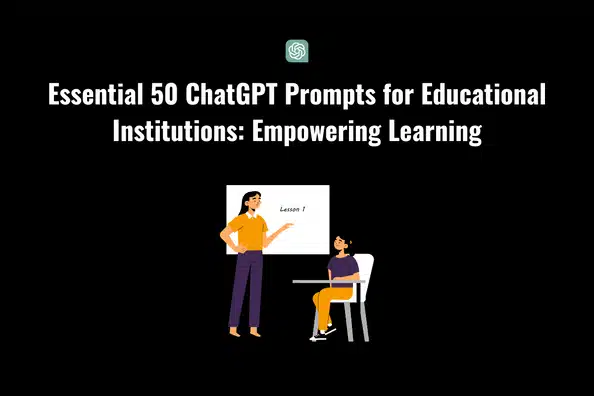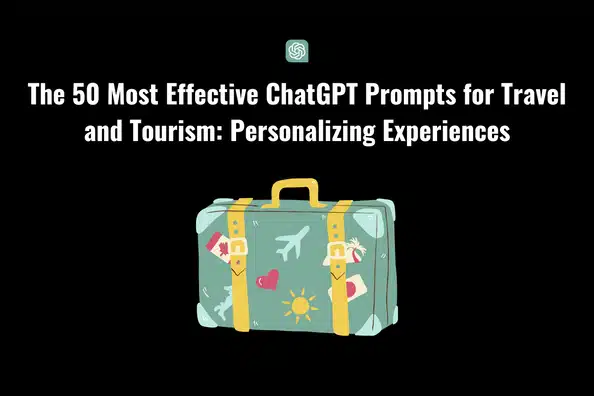Engineering is a dynamic field where accuracy, precision, and detailed documentation are critical. Whether you’re conducting research, preparing technical reports, or writing academic papers, using effective prompts to generate content can save you time and enhance your productivity.
ChatGPT, with its powerful AI capabilities, can assist engineers and academics in structuring technical content, generating ideas for research, or even simplifying complex explanations for different audiences.
In this blog post, we will explore how ChatGPT can be utilized in engineering through carefully crafted prompts to generate various types of engineering journal entries, academic papers, technical reports, and more.
This guide will cover prompts for both professional engineers and engineering students to help improve their technical writing and research efficiency.
Why Use ChatGPT for Engineering Writing?
ChatGPT can be an invaluable tool for engineers because it helps streamline the writing process and automates some of the more tedious aspects of documentation. Here’s why ChatGPT is particularly useful for engineering academics and professionals:
- Speed and Efficiency: Writing technical reports, research papers, and documentation can be time-consuming. ChatGPT can draft content based on your input, allowing you to focus on analysis and refinement.
- Clarity and Structure: ChatGPT can help structure your writing, ensuring clarity in your technical documentation, which is essential for engineering content.
- Idea Generation: For research, project planning, or problem-solving, ChatGPT can assist in generating new ideas, laying out potential solutions, or proposing methodologies.
- Simplification of Complex Topics: ChatGPT can simplify complex technical concepts for non-expert audiences or help you prepare explanations for presentations or reports.
Now, let’s dive into detailed prompts that will help you make the most out of ChatGPT for engineering writing.
ChatGPT Prompts for Engineering Journal Writing
Writing journal articles for engineering requires precision, deep technical knowledge, and the ability to communicate complex ideas clearly. The following prompts will help you create high-quality journal entries, whether you are documenting research findings, technical methodologies, or reviewing engineering literature.
1. Writing an Engineering Research Paper
One of the core responsibilities of academic engineers is to publish research papers. Crafting a well-organized and coherent research paper is critical for effectively communicating your findings. Here’s a prompt to get started on writing a research paper:
Prompt: “Draft an engineering research paper on the topic of ‘Artificial Intelligence in Civil Engineering,’ including sections for abstract, introduction, methodology, results, and conclusion.”
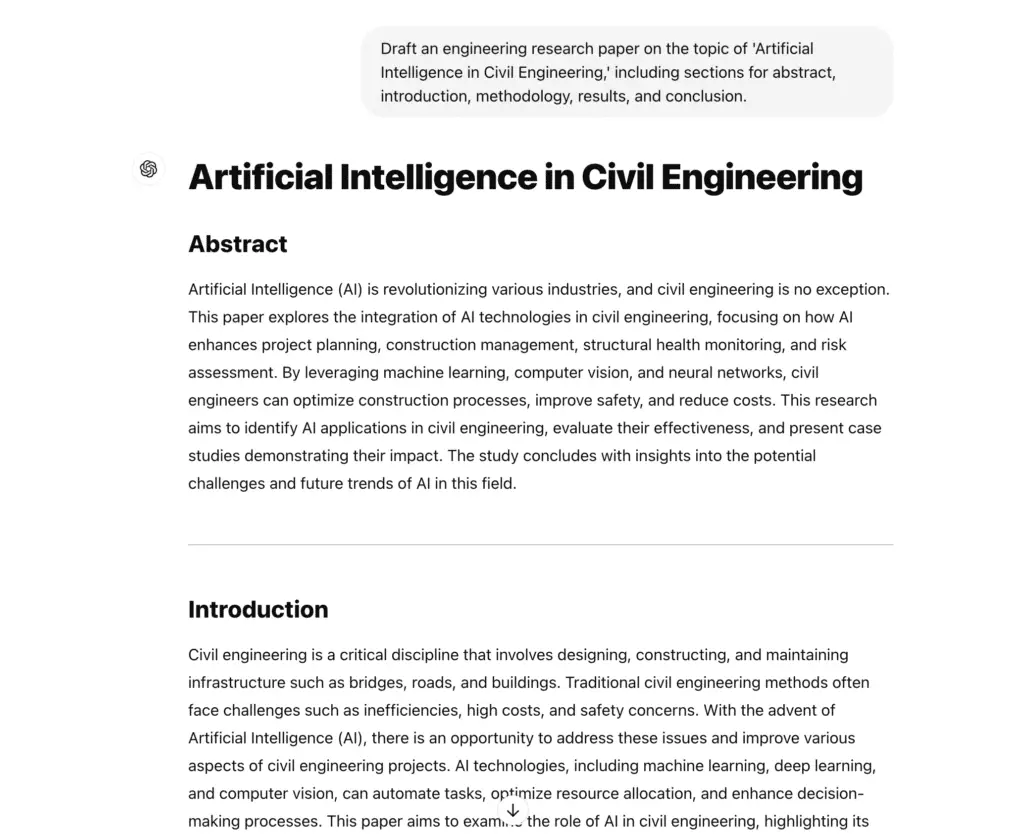
This prompt will help ChatGPT structure the entire research paper, giving you a strong base to expand upon by adding your research findings and data.
2. Writing a Literature Review
A literature review is essential in research papers to establish the foundation of your study. Use this prompt to generate a literature review on any engineering subject:
Prompt: “Write a literature review on the current applications of nanotechnology in material science, focusing on its impact on structural durability and efficiency.”
ChatGPT will summarize relevant research and trends, which you can supplement with specific sources from your field.
3. Methodology Section for an Engineering Paper
The methodology section explains the technical approach used in your research. For engineering papers, this section needs to be precise and detail-oriented. Use this prompt to generate a well-structured methodology:
Prompt: “Write a methodology section for a research paper on optimizing renewable energy systems using machine learning algorithms. Include details on data collection, algorithm selection, and performance metrics.”

This prompt will help create a clear and structured methodology, which you can refine with the specific tools, techniques, and metrics used in your research.
4. Writing the Results and Discussion Section
The results and discussion sections are crucial in interpreting your findings and placing them in context within your field of study. ChatGPT can help you present these sections coherently and logically:
Prompt: “Write the results and discussion section for a study that investigated the thermal efficiency of novel composite materials used in high-temperature engineering applications.”
Once the base is generated, you can input your data and tweak the discussion to align with your findings.
5. Writing the Abstract for a Research Paper
The abstract is a concise summary of your research, typically written last but placed at the beginning of your paper. It provides an overview of your study, including the purpose, methodology, key findings, and implications:
Prompt: “Generate an abstract for a research paper on the impact of IoT (Internet of Things) on predictive maintenance strategies in industrial engineering.”
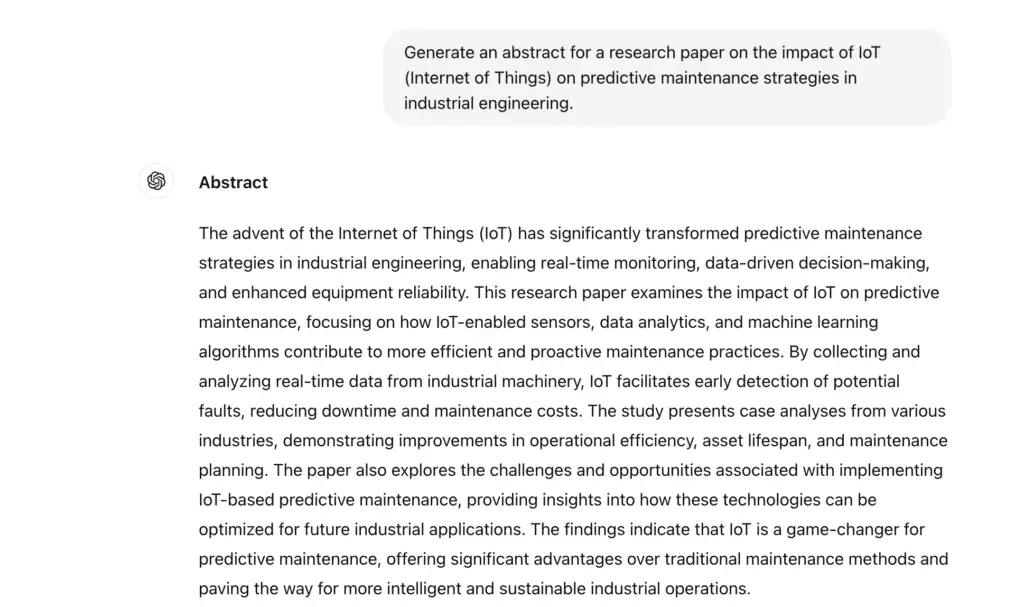
This will help you create an informative abstract that highlights the key points of your research, helping readers quickly grasp the purpose and significance of your study.
ChatGPT Prompts for Writing Technical Reports
Engineers often need to produce detailed technical reports to document project progress, experiment results, or system analysis. Technical reports require clear writing, a logical structure, and well-documented data. Below are prompts to assist with different parts of technical reports.
1. Writing a Technical Report on System Design
Designing complex systems requires detailed documentation, and technical reports help communicate the design process and solutions. Here’s a prompt to write a system design report:
Prompt: “Write a technical report on the design and development of an automated irrigation system for smart agriculture. Include sections on design requirements, system architecture, components used, and testing results.”
This will help you draft a structured report that highlights the core components and testing phases of your design project.
2. Failure Analysis Report
Failure analysis reports are essential when evaluating why a particular engineering system or component failed. Such reports need to provide clear evidence of the causes and recommend solutions for future improvements:
Prompt: “Create a failure analysis report for a high-pressure steam boiler system. Include sections for failure modes, contributing factors, root cause analysis, and recommendations for improvement.”
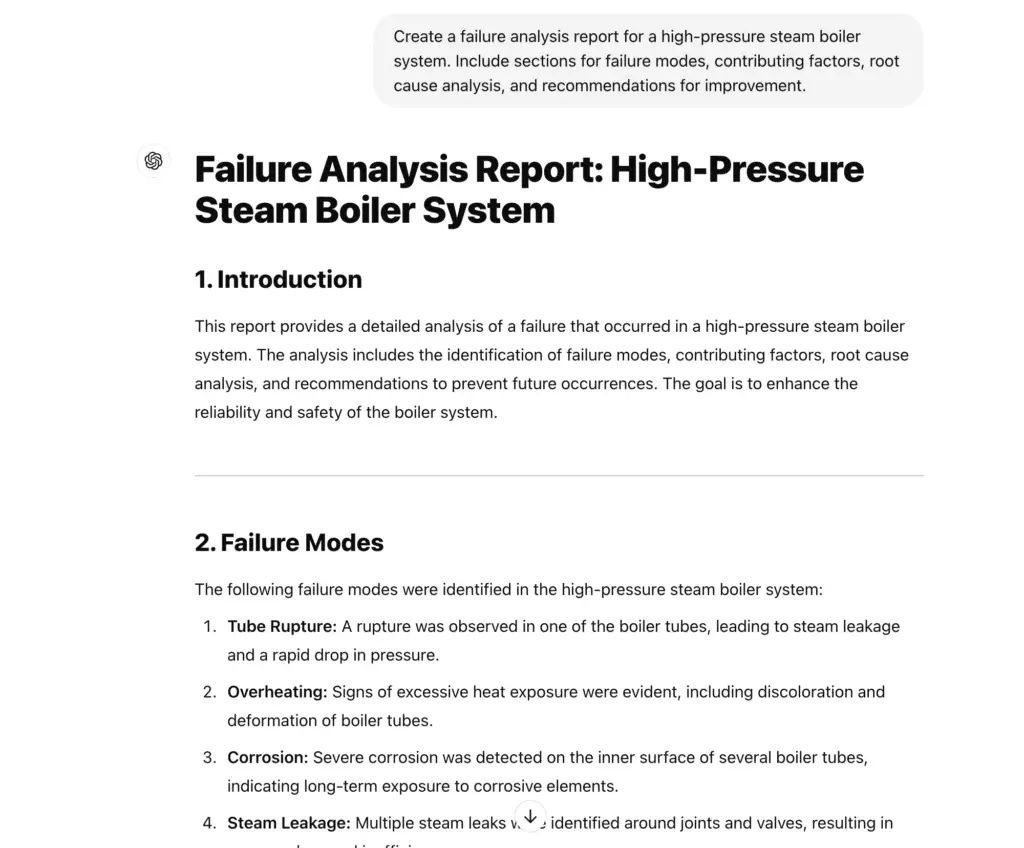
This will guide ChatGPT to structure the report based on engineering failure analysis frameworks, allowing you to input case-specific data and analysis.
3. Technical Specifications Documentation
Technical specifications are key documents that outline the criteria, functions, and operational requirements for engineering systems or components:
Prompt: “Write technical specifications for a solar-powered water pumping system, including sections on operational requirements, performance criteria, environmental considerations, and safety standards.”
ChatGPT will generate a draft document that clearly specifies the technical and functional aspects of the system, which you can refine based on the actual specifications and standards used in your project.
4. Writing Project Progress Reports
For large engineering projects, project managers must submit regular progress reports. These reports document completed tasks, current issues, and future milestones:
Prompt: “Write a project progress report for a bridge construction project, including sections on work completed, current challenges, budget status, and upcoming milestones.”
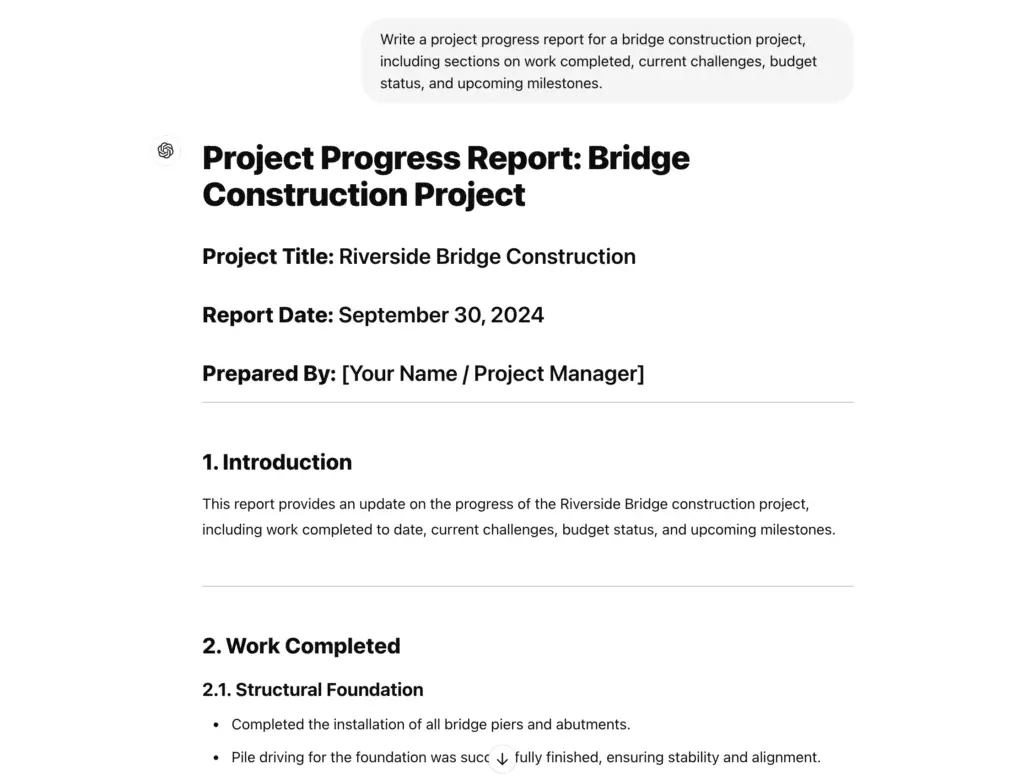
This prompt helps you create a professional and organized report that tracks the project’s progress and outlines next steps.
ChatGPT Prompts for Engineering Documentation and Communication
Documentation and effective communication are essential components of engineering, ensuring that technical information is accessible and understandable to all stakeholders. Whether you’re documenting processes, writing manuals, or explaining complex ideas to non-technical audiences, ChatGPT can help streamline your efforts.
1. Writing User Manuals for Engineering Products
User manuals are critical for guiding the end-user on how to operate complex engineering systems or products. Writing clear, step-by-step instructions is essential:
Prompt: “Write a user manual for an autonomous drone system, including sections on initial setup, operational instructions, safety precautions, and troubleshooting.”
ChatGPT will generate a comprehensive user manual that can be tailored to your specific product, providing clear and concise instructions for users.
2. Simplifying Complex Engineering Concepts for Non-Technical Audiences
Communicating technical information to non-engineers can be challenging, especially when dealing with complex systems. ChatGPT can help simplify these concepts for broader audiences:
Prompt: “Explain the concept of load balancing in cloud computing for a non-technical audience, using simple terms and analogies.”
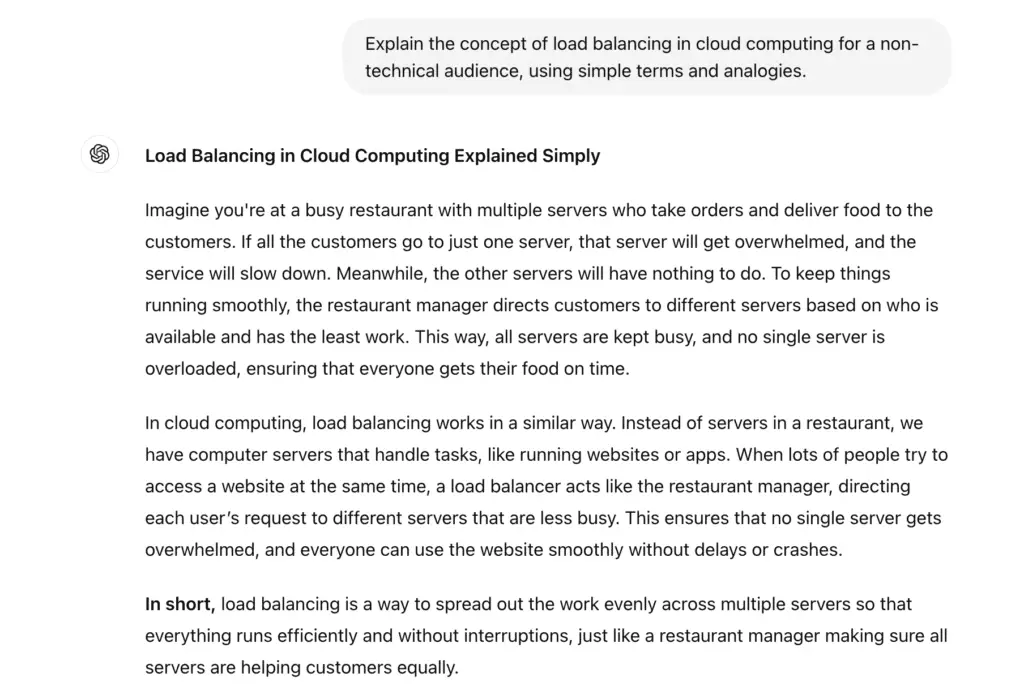
ChatGPT will help you break down complex engineering concepts, making them easier to understand for stakeholders who may not have a technical background.
3. Writing Standard Operating Procedures (SOPs)
Standard Operating Procedures (SOPs) provide step-by-step instructions on how to perform tasks consistently and accurately within an engineering process. ChatGPT can help draft SOPs quickly:
Prompt: “Write a Standard Operating Procedure (SOP) for the calibration and maintenance of industrial pressure sensors. Include steps for setup, calibration, testing, and documentation.”
This will help you create a professional SOP that ensures proper execution of tasks and maintains quality control within engineering processes.
ChatGPT Prompts for Engineering Research and Idea Generation
One of the most significant advantages of ChatGPT is its ability to assist with brainstorming and generating ideas for research, experiments, and engineering projects. Whether you’re looking to explore new areas of study or refine an existing project, these prompts can help spark creativity.
1. Generating Research Ideas in Engineering
Finding the right research topic can be difficult, especially in a broad field like engineering. ChatGPT can suggest research ideas based on the latest trends and innovations:
Prompt: “Generate research ideas for sustainable engineering projects, focusing on renewable energy, carbon capture, and energy-efficient building designs.”
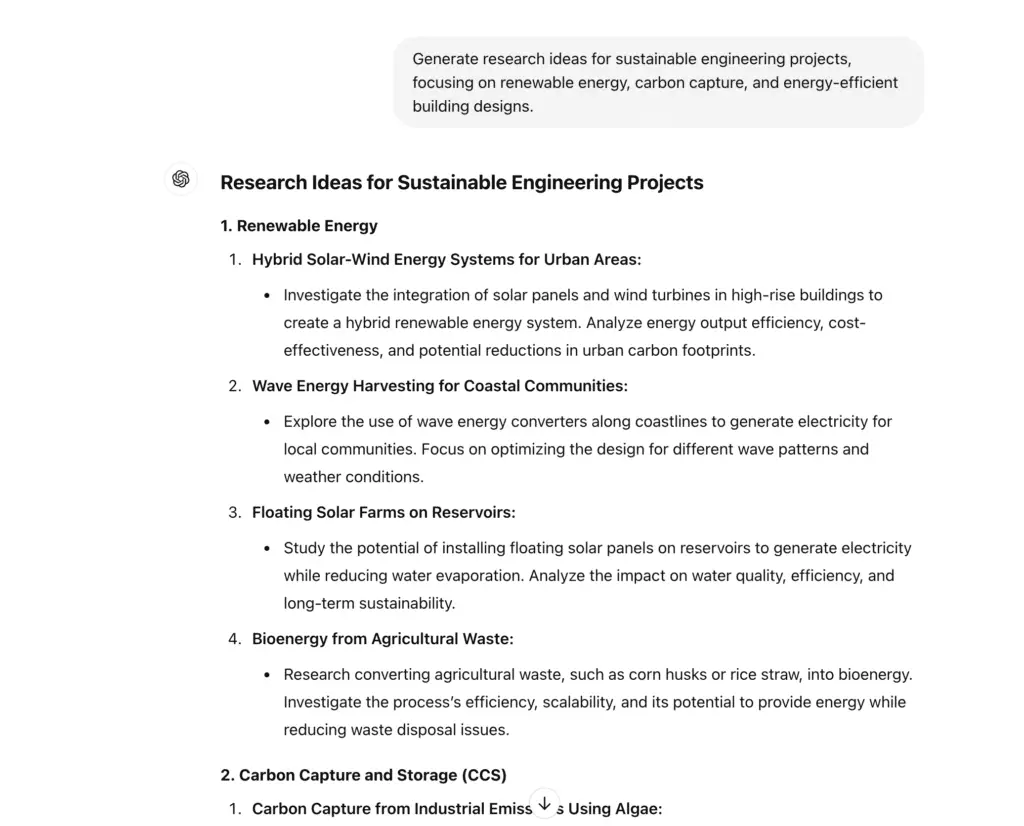
ChatGPT will provide a list of potential topics, helping you select a research area aligned with your interests and expertise.
2. Hypothesis Generation for Engineering Experiments
Formulating hypotheses is a crucial step in any experimental research. ChatGPT can assist in generating clear and testable hypotheses for your engineering experiments:
Prompt: “Generate a hypothesis for an experiment on the efficiency of different heat exchangers in industrial cooling systems.”
This will guide you in developing a strong hypothesis, which can then be tested through your experimental research.
3. Outlining a Research Proposal
Research proposals are a key part of applying for grants or gaining approval for projects. Use ChatGPT to help you outline a detailed and convincing research proposal:
Prompt: “Outline a research proposal for a study on the use of AI in optimizing traffic management systems in urban areas. Include sections for objectives, methodology, expected outcomes, and budget estimates.”
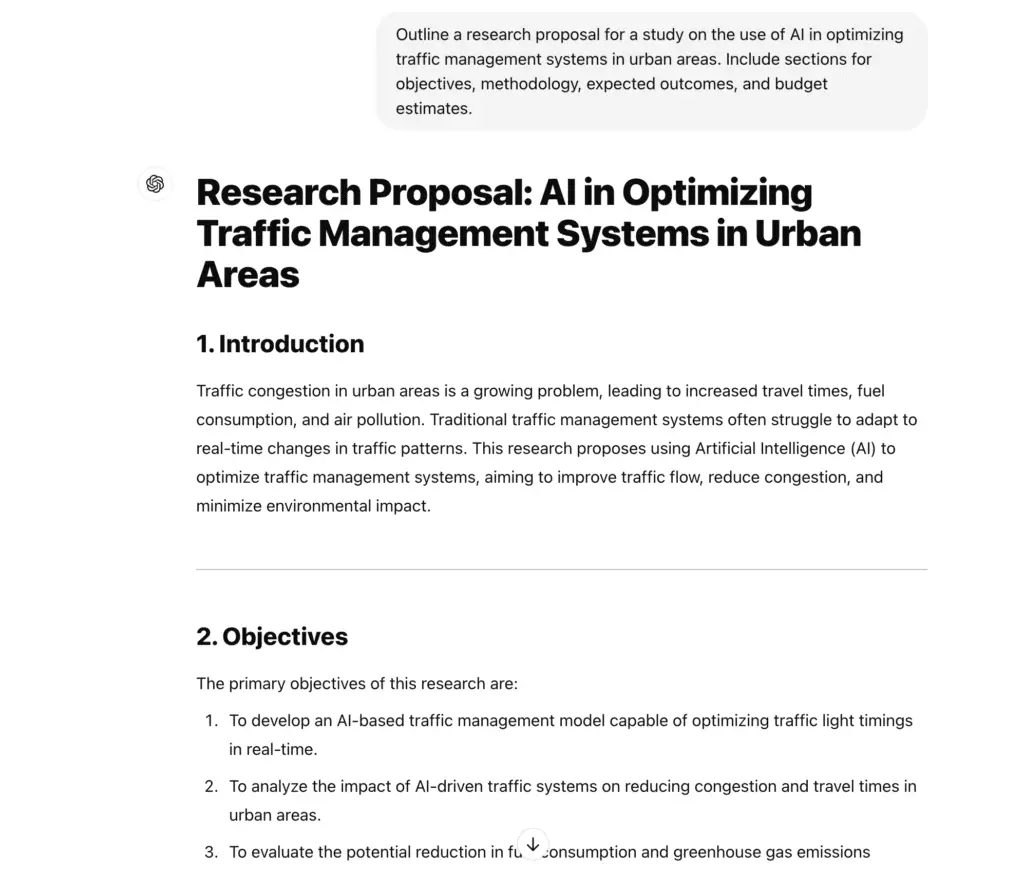
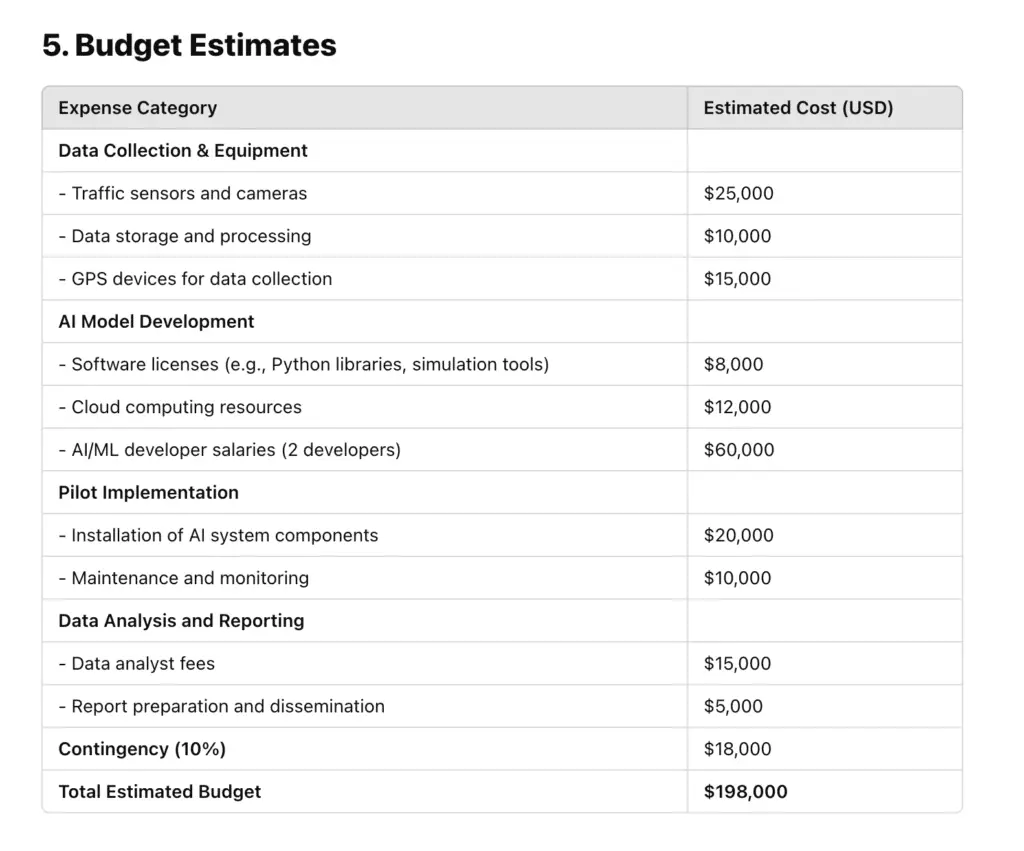
This will give you a strong foundation for your research proposal, which you can refine with specific details and project plans.
ChatGPT Prompts for Academic and Engineering Presentations
Engineers and academics often need to present their research findings, project updates, or technical concepts to various audiences, ranging from industry experts to non-technical stakeholders. Below are some prompts to help you create effective presentations.
1. Writing a Technical Presentation Outline
Outlining a technical presentation is essential for ensuring that your ideas are clearly communicated. Use this prompt to structure a presentation:
Prompt: “Create an outline for a technical presentation on the advancements in 3D printing technology for biomedical applications. Include sections for introduction, technical explanation, case studies, and future implications.”
This outline will provide a clear structure for your presentation, which can then be expanded into full slides.
2. Preparing a Research Poster Presentation
For academic conferences, research posters are a common way to present research findings. ChatGPT can help you structure and write the key sections of your poster:
Prompt: “Write the key sections for a research poster on the application of graphene-based materials in thermal management systems, including an abstract, methodology, results, and conclusion.”
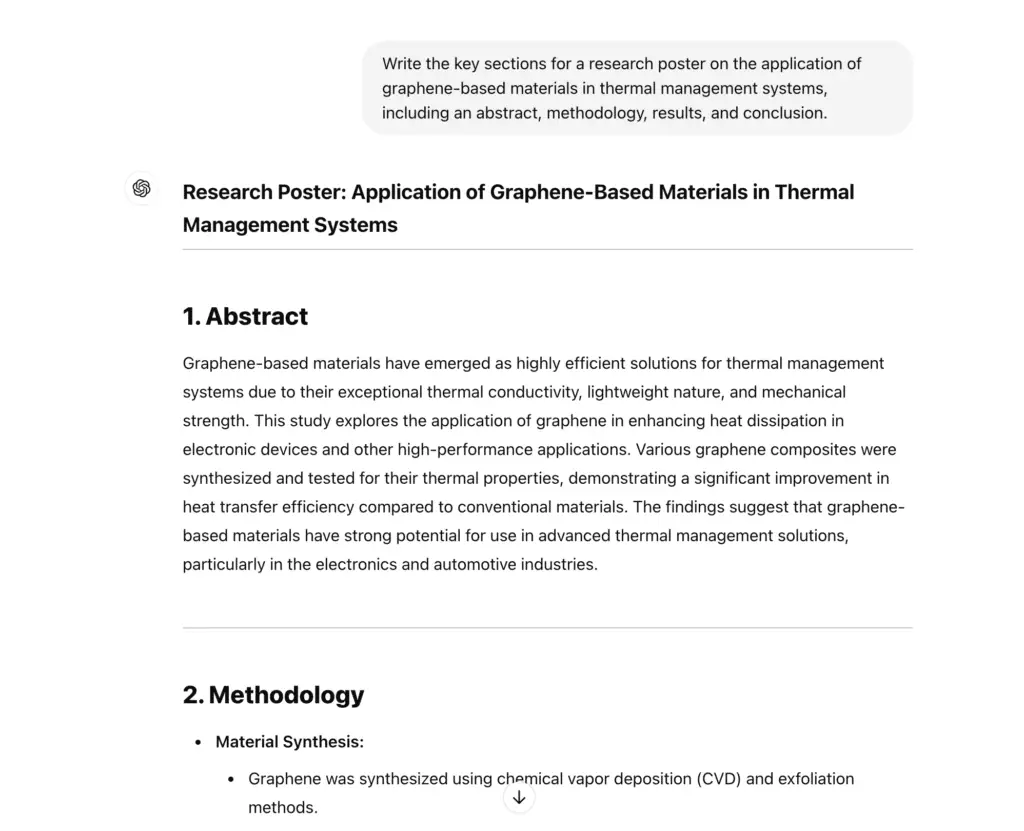
This will guide you in creating a concise and well-organized poster that communicates your research findings effectively.
3. Crafting a Non-Technical Summary for a Presentation
When presenting complex engineering topics to non-technical audiences, it’s important to simplify the content without losing its essence:
Prompt: “Write a non-technical summary for a presentation on the benefits of smart grid technology in reducing energy consumption and improving grid reliability.”
ChatGPT will help you communicate your findings in a way that’s easy to understand, even for those without a technical background.
ChatGPT Prompts for Engineering Academia
Engineering students and academics can benefit from ChatGPT’s ability to generate content for academic assignments, research papers, and lectures. Here are some prompts tailored for engineering academia.
1. Writing a Lab Report
Lab reports document the results of experiments and must include detailed observations and conclusions. Use this prompt to structure a lab report:
Prompt: “Write a lab report for an experiment on fluid dynamics, including sections on objectives, equipment used, procedure, observations, results, and conclusion.”
This will generate a clear framework for your lab report, which you can fill in with specific details from your experiment.
2. Creating an Assignment for Engineering Students
Professors can use ChatGPT to create assignments for their engineering students. Here’s a prompt to generate an assignment on a technical subject:
Prompt: “Create an engineering assignment for mechanical engineering students on the topic of thermodynamics. Include questions on heat transfer, thermodynamic cycles, and energy efficiency calculations.”
This prompt will generate questions that can be adjusted based on the difficulty level and the specific learning objectives of the course.
3. Writing Lecture Notes on Engineering Topics
Lecturers often need to prepare detailed notes for their courses. ChatGPT can assist in creating well-structured lecture notes:
Prompt: “Write lecture notes for an introductory class on control systems engineering, covering topics such as system modeling, feedback control, and transfer functions.”
ChatGPT will generate detailed and organized notes, which can be used for preparing your lecture or shared with students.
Final Thoughts
Whether you’re a professional engineer, an academic, or an engineering student, ChatGPT offers valuable support throughout your writing and research processes. From generating research papers and technical reports to writing presentations and lab reports, ChatGPT can streamline your work, allowing you to focus more on innovation and problem-solving.
By leveraging the power of AI, you can enhance your writing, improve your productivity, and communicate complex engineering concepts more effectively. With the right prompts, ChatGPT is a powerful tool for any engineer or engineering academic seeking to optimize their workflow and produce high-quality content.
Frequently Asked Questions (FAQs)
Can ChatGPT help with writing research papers for engineering?
Yes, ChatGPT can assist in writing research papers by helping you structure sections like the introduction, methodology, results, and conclusion. It can also generate abstracts, literature reviews, and summaries for your research papers.
How can ChatGPT be used for engineering technical reports?
ChatGPT can generate drafts of technical reports, including sections for design specifications, system analysis, project progress, and failure analysis. By using specific prompts, you can ensure that the report is well-organized and clear.
Can ChatGPT simplify technical concepts for a non-technical audience?
Yes, ChatGPT is effective at simplifying complex engineering topics by breaking them down into easy-to-understand language. This can be particularly useful when communicating with clients, stakeholders, or students who may not have a technical background.
Can ChatGPT assist with idea generation for engineering research?
Absolutely. ChatGPT can generate research ideas and hypotheses, helping you brainstorm innovative approaches to engineering problems. It can also assist in outlining research proposals and defining key objectives and methodologies.
Is ChatGPT useful for engineering presentations?
Yes, ChatGPT can help structure presentations, whether they are technical or for a general audience. It can also assist in writing research posters or crafting non-technical summaries for conferences and industry events.

